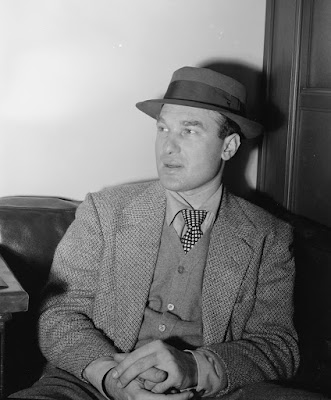Norman Granz created Verve to produce new recordings by Ella Fitzgerald, whom he managed; the first album the label released was Ella Fitzgerald Sings the Cole Porter Song Book. The catalog grew throughout the 1950s and 1960s to include dozens of jazz greats. Granz was a fundamental figure in American jazz, especially from about 1947 to 1960. He was also the founder of Clef, Norgran, Down Home and Pablo.

Many of the names that made history in jazz signed with one of Norman Granz's labels, including Louis Armstrong, Ella Fitzgerald, Count Basie, Louie Bellson, Benny Carter, Buck Clayton, Buddy DeFranco, Roy Eldridge, Herb Ellis, Tal Farlow, Stan Getz, Dizzy Gillespie, Lionel Hampton, Coleman Hawkins, Johnny Hodges, Billie Holiday, Illinois Jacquet, Hank Jones, Gene Krupa, Anita O'Day (the first artist to sign with Verve), Charlie Parker, Joe Pass, Oscar Peterson, Flip Phillips, Bud Powell, Buddy Rich, Sonny Stitt, Slim Gaillard, Art Tatum, Ben Webster and Lester Young.
In the segregated society of the 1940s, Granz insisted on equal pay and
accommodation for white and black musicians. He refused to take his
hugely popular concerts to places which were segregated, even if he had
to cancel concerts, thereby sacrificing considerable sums of money.
Granz opposed racism and fought many battles for his artists, many of whom were black. In 1955, in Houston, Texas, he removed signs that designated "White" and "Negro" seating areas in the auditorium where two concerts were to be performed by Ella Fitzgerald and Dizzy Gillespie. Between the two shows Fitzgerald and Gillespie were playing cards in the dressing room when they were arrested by local police. After some negotiations, the artists were allowed to perform the second show and later were formally released. Granz nevertheless insisted on fighting the charges, which cost him a $2,000 fine.
Oscar Peterson recounted how Granz once insisted that white cabdrivers take his black artists as customers while a policeman pointed a loaded pistol at his stomach. Granz also was among the first to pay white and black artists the same salary and to give them equal treatment even in minor details, such as dressing rooms.
Granz also spearheaded the fight to desegregate the hotels and casinos in Las Vegas, arguing that it was unfair that black artists could perform on the stages, but could not stay or gamble at the hotels, or even enter through the front doors.
Granz opposed racism and fought many battles for his artists, many of whom were black. In 1955, in Houston, Texas, he removed signs that designated "White" and "Negro" seating areas in the auditorium where two concerts were to be performed by Ella Fitzgerald and Dizzy Gillespie. Between the two shows Fitzgerald and Gillespie were playing cards in the dressing room when they were arrested by local police. After some negotiations, the artists were allowed to perform the second show and later were formally released. Granz nevertheless insisted on fighting the charges, which cost him a $2,000 fine.
Oscar Peterson recounted how Granz once insisted that white cabdrivers take his black artists as customers while a policeman pointed a loaded pistol at his stomach. Granz also was among the first to pay white and black artists the same salary and to give them equal treatment even in minor details, such as dressing rooms.
Granz also spearheaded the fight to desegregate the hotels and casinos in Las Vegas, arguing that it was unfair that black artists could perform on the stages, but could not stay or gamble at the hotels, or even enter through the front doors.

In 1956 Ella Fitzgerald joined the Norman Granz Verve label. Granz had been her manager for
some time, and unified his activities under the common label of Verve Records. Granz became Fitzgerald's manager, and remained so until the end of her career. Fitzgerald's memorable series of eight Songbooks,
together with the duet series (notably Armstrong-Peterson,
Fitzgerald-Basie, Fitzgerald-Pass and Getz-Peterson) achieved wide
popularity and brought acclaim to the label and to the artists. Granz
was also the manager of Oscar Peterson, another lifelong friend.

Granz was born on August 6, 1918, in Los Angeles, California, the son of Jewish immigrants from Tiraspol, in Moldova. Tiraspol was founded in 1792. The toponym consists of the two ancient Greek words: Τύρας, Tyras, the Ancient name for the Dniester River, and polis, i.e., a city (state). Tyras (Τύρας), also spelled Tiras, was a colony of the Greek city Miletus, probably founded about 600 BC,
situated some 10 kilometres (6 miles) from the mouth of the Tiras River
(Dniester). In the 2nd century
BC, it fell under the dominion of indigenous kings whose names appear on its coins. It was destroyed by the Thracian Getae about 50 BC.
Granz was acknowledged as "the most successful impresario in the history of jazz". In December of 1960, he sold Verve Records to Metro-Goldwyn-Mayer. He founded his last label, Pablo Records, in 1973; in 1987, he sold it to Fantasy Records.
Granz died on November 22, 2001 , in Geneva, Switzerland. He was 83 years old.
Dizzy Gillespie
Billie Holiday
Gil Mellé – The Andromeda Strain
Anita O'Day
Charlie Parker
Joe Pass
Oscar Peterson
Cole Porter
Art Tatum
Lester Young
Net links:
Billie Holiday
Gil Mellé – The Andromeda Strain
Anita O'Day
Charlie Parker
Joe Pass
Oscar Peterson
Cole Porter
Art Tatum
Lester Young
Net links:
New York Times obit
NPR obit
Jazz Times ~ Goodbye, My Friend
udiscovermusic ~ The Man Who Made Jazz, Black AND White
PopMatters ~ The Man Who Used Jazz for Justice
NPR obit
Jazz Times ~ Goodbye, My Friend
udiscovermusic ~ The Man Who Made Jazz, Black AND White
PopMatters ~ The Man Who Used Jazz for Justice
''You sit where I sit you.
You don’t want to sit next to a black,
here’s your money back.''
You don’t want to sit next to a black,
here’s your money back.''



No comments:
Post a Comment
PLEASE NOTE: comments are moderated BEFORE they are posted so DO NOT appear immediately.
Thank you.